The latest aphasia research in the ASHA Journals can help clinicians dedicated to helping people with aphasia communicate and shape the future of aphasia care. In honor of Aphasia Awareness Month, we’re sharing some of the most read and most talked about aphasia articles in the past year.
Socialization and Communication
“I Could Not Talk . . . She Did Everything . . . She’s Now My Sister”: People With Aphasia’s Perspectives on Friends Who Stuck Around: People with aphasia may have more difficulty developing and maintaining friendships—a reality that may negatively affect their mental and physical health. Interview data from people with aphasia in this article can help provide actionable steps when helping patients focus on and maintain friendships.
Generalization in Aphasia Treatment: A Tutorial for Speech-Language Pathologists: When working with patients with aphasia, speech-language pathologists (SLPs) teach skills that they hope are generalizable or that people can use in real-world communication. This tutorial can help any SLP plan and measure the generalization of the methods that they target in the clinic.
Enhancing Care and Counseling
A Roadmap to Enhance Care for People Living With Primary Progressive Aphasia: What Can Be Done Now? Clinicians must provide palliative, person-centered services for people with primary progressive aphasia, who may be dealing with grief as their communication abilities decline. Learn concrete steps that you as the clinician can take to improve the assessment and intervention experiences for these individuals.
In the Driver’s Seat: Narrative-Based Counseling in Aphasia: Narrative-based counseling approaches have been successful in people who stutter—but have not been implemented widely in individuals with aphasia. Read about how these techniques can be adapted for and implemented in aphasia intervention.
Naming Treatment in Aphasia
A Meta-Analysis of Anomia Treatment in Bilingual Aphasia: Within- and Cross-Language Generalization and Predictors of the Treatment Outcomes: Bilingual people with aphasia experience anomia—or issues with word retrieval—in both languages. In this article, the authors (a) compared anomia treatment methods across languages and items and (b) attempted to identify predictors of anomia outcomes in patients.
Errorless, Errorful, and Retrieval Practice for Naming Treatment in Aphasia: A Scoping Review of Learning Mechanisms and Treatment Ingredients: Researchers know little about the learning mechanisms used in aphasia interventions, which could help clinicians identify the most essential elements of treatment for each individual. This scoping review of the existing evidence in naming treatment for aphasia highlights current research gaps—and how this research can help SLPs.
Spreading Aphasia Awareness
The National Aphasia Association reveals that more than 80% of Americans have never heard the term aphasia. Sharing basic information on aphasia with friends and family or on social media is a great way to start to change that! The ASHA Practice Portal, for example, contains information and facts such as what aphasia is, its signs and symptoms, and its causes. These articles are just a small sample of the dozens of articles on aphasia published every year across the ASHA Journals. This research can help you provide and facilitate better care for the thousands of people across the country who are living with aphasia.







